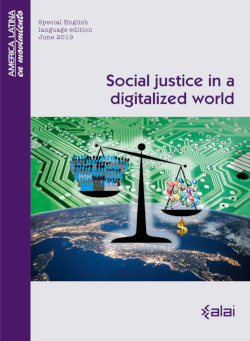The digitalization of work and its consequences for the Global South
There is a growing global debate on the nature and scope of a "fourth industrial revolution", with potentially significant impacts on employment and more broadly on labour.
- Análisis

| Article published in ALAI’s magazine No. 542: Social justice in a digitalized world 24/06/2019 |
The "digital revolution" and the way it impacts work are receiving increasing attention, but this attention remains mainly concentrated in countries of the Global North. Yet, these developments also concern countries in the Global South, but with particular modalities that require specific analyses and reactions.
There is a growing global debate on the nature and scope of a "fourth industrial revolution", with potentially significant impacts on employment and more broadly on labour. Two trends are especially discussed. First of all, the automation of tasks, particularly owing to advances in artificial intelligence. Secondly, the development of "platform work", in particular via applications such as Deliveroo or Uber. These trends are observable worldwide, but their consequences are not the same for workers in the Global North and Global South.
Automation, for example, could eventually threaten more jobs in the South than in the North, but at a slower pace. Nor are the same sectors (and therefore the same workers) concerned in both latitudes. The automation of agriculture, for example, will have specific consequences in the South, with increasing concentration of farming, an even more acute competition facing small producers and the strengthened control of large global agri-food groups over global agricultural production and distribution. Finally, the potential for automation in the North significantly reduces the "comparative advantages" that countries in the South have hitherto been able to derive from the (literal and figurative) exploitation of their abundant cheap labour. Export-led industrialization strategies, pursued in particular by many Asian countries (and acclaimed throughout the developing world in the 1990s), may thus no longer be accessible to many developing countries, leaving open the question of available options to replace them.
Platforms as opportunities or threats?
Concerning platform work, there is a tendency to view it mainly in the North as a threat to traditional employment relationships, insofar as they generally offer a task-based remuneration, most often under a self-employed status. However, the threat is obviously not the same in southern countries where wage employment has never been the norm. Some, such as the World Bank, even see the development of on-demand working platforms as a boon to people in the Global South. Indeed, it is usually enough to have a smartphone and an internet connection to be able to start working. And "micro-work" platforms even provide access to job offers that can come from anywhere in the world. In addition, at present many of these tasks (e.g. delivery, taxis, cleaning) are carried out in the informal sectors, which means that these platforms make way for a (relative...) formalisation of this work, unlike what is happening in northern countries.
However, it should be recalled that Internet access is far from being widespread in the South, with penetration rates often below 50% of the population (especially in sub-Saharan Africa and South Asia) compared to around 90% in Europe and North America. And it is precisely the already most marginalized sectors of the population who have the least access to it. And even when they do have access, the quality is often lower than that of the most advantaged populations/regions, not to mention the differences in skills and qualifications that constitute an additional handicap. More than a boon, the arrival of these platforms could therefore lead above all to the further marginalization of the least qualified and/or least connected workers, in particular by further restricting the limited opportunities they hitherto had in the informal economy.
Moreover, the idea of neutral platforms free of "race", class or gender bias is also false. Indeed, users' personal information is by nature accessible to others through their "profile" and (at least for the moment) nothing prevents this information from being used to refuse a service provider and/or to refuse to perform a service. Even algorithms are not immune to this type of bias since the criteria they use to assess, rank, etc. may favour some population groups over others. As various studies have shown, far from eliminating inequalities, platforms are therefore part of their reproduction (or even aggravate them), both within and between countries.
Finally, it should be recalled that working conditions in these platforms also remain problematic, with low and irregular pay, excessively long and/or variable working hours, the lack of social protection and collective bargaining, the dangerous nature of activities and discrimination.
The broader challenge of the "digital economy"
More broadly, however, it is above all the very logic underlying the functioning of the digital economy as a whole that constitutes the main challenge for workers in general and for workers in the South in particular. Indeed, this new economy is based on the extraction and exploitation of "data" whose status is ambiguous to say the least. On the one hand, companies consider them as resources they can use as they wish. But on the other hand, these data are produced by individuals and groups of individuals who could assert legitimate political and social rights over them. We often talk about the right to privacy, but this could also include the right to remuneration or collective control of authorized uses.
Another problem is that the network effect associated with services based on those data leads to the creation of huge monopolies with unprecedented market power, resulting in new forms of control and exploitation of labour, which are hard to combat as they tend to appear as the consequences of strictly technical processes. For example, Amazon relies on recording its workers' productivity data to automatically lay off those with the lowest performances. More broadly, as a sector digitalizes, it becomes increasingly difficult, if not impossible, for small producers to participate without entering more or less directly into the dependence of a digital giant.
The situation is even more problematic for workers and populations in the Global South, since most of these digital monopolies are based in the North, and in particular in the United States, creating new global dependencies and exploitation relationships with potentially significant economic and geopolitical consequences. In this context, the ongoing global discussions on the liberalization of "e-commerce" will prove crucial, since they may well enshrine the current situation by drastically limiting the possibilities of regulating the digital economy for the benefit of populations and workers, particularly in the South. The Trans-Pacific Partnership Agreement (TPP) or the new United States-Mexico-Canada Agreement (USMCA) already include clauses that prevent the "free flow of data across borders" from being infringed, or that ban data localization requirements. And this type of clause is now being discussed worldwide within the framework of the WTO[1].
However, other orientations are possible. At a minimum, they imply curtailing the current discussions on "el-commerce" in order to avoid reducing the issues raised by the digital economy to the sole angle of trade. Its implications include the economy as a whole, but also the political sphere and the sphere of human and social rights. Only then could we conceive principles, policies and institutions to make digital technologies available to workers and populations in the North and South, while respecting environmental constraints and development differences between countries and regions of the world.
(Translation: the author and ALAI)
Cédric Leterme, Doctor of Political and Social Sciences, researcher at CETRI-Centre tricontinental (www.cetri.be).
Del mismo autor
- Au-delà de la « menace » chinoise 26/03/2021
- Africa’s digitalization and the ecological dilemma 28/07/2020
- The Digital Justice Manifesto 12/02/2020
- Un manifiesto por la justicia digital 12/02/2020
- Manifeste pour une justice numérique 17/01/2020
- Global business of bytes 18/11/2019
- La Belgique sur l’échiquier mondial d’Alibaba 02/10/2019
- The digitalization of work and its consequences for the Global South 10/07/2019
- La numérisation du travail et ses conséquences pour le Sud 26/06/2019
- La digitalización del trabajo y sus consecuencias para el Sur 26/06/2019
Clasificado en
Clasificado en:
Comunicación
- Jorge Majfud 29/03/2022
- Sergio Ferrari 21/03/2022
- Sergio Ferrari 21/03/2022
- Vijay Prashad 03/03/2022
- Anish R M 02/02/2022
Internet ciudadana
- Nick Bernards 31/03/2022
- Paola Ricaurte 10/03/2022
- Burcu Kilic 03/03/2022
- Shreeja Sen 25/02/2022
- Internet Ciudadana 16/02/2022









